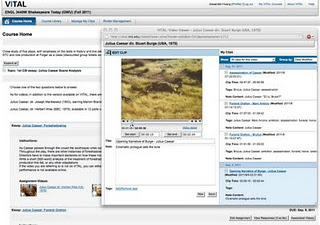| Dr. Huang being filmed by BBC crew at the 2011 Edinburgh International Festival |
There was a tempest of sorts happening outside as I rushed over puddles and clumps of wet leaves to catch one of newly-arrived Professor Alex Huang's courses entitled "Global Shakespeare." The course title could easily be describing Dr. Huang himself, a native of Taiwan, who first encountered a performance of the Bard's work in Germany--coincidentally, it was a performance of The Tempest--while an exchange student. Even his name is cross-cultural (much of his scholarship focuses on this subject) as his father, a historian, named him for the legendary Greek general.
Dr. Huang
brings to GW years of experience as a Shakespeare scholar, and numerous
accolades, including the prestigious MLA Aldo and Jeanne Scaglione Prize for his book Chinese Shakespeares: Two Centuries of Cultural Exchange. With
his bona fides and experience—he holds a Ph.D. in Comparative
Literature and a Joint Ph.D. in interdisciplinary studies in
humanities from Stanford University—why choose Washington, D.C.
over, say, London or New York?
“Because
the English Department is a smart and collegial community and GW is at a
very exciting moment of development under the leadership of the
president and provost," says Dr. Huang. "And there is so much going on
in Washington, D.C., around Shakespeare." He offers the presence of the Folger Shakespeare Library (with
which he has closely collaborated in the past) and three Shakespeare
companies as examples. Dr. Huang was also very excited to work with
colleagues in the GW Medieval and Early Modern Studies Institute.
Along with the Ford Foundation Professor of Humanities Peter Donaldson at MIT, Dr. Huang was the driving force behind Global Shakespeares, a video archive--it is more accurate to call it the video
archive--of worldwide Shakespeare performances that scholars, students,
and anyone else can use to access Shakespeare around the globe.
“I think of (Global Shakespeare) as a YouTube for Shakespeare lovers,” says Dr. Huang.
I arrive at his class a little late, spilling coffee in the process, but he is too engrossed in a lecture on Julius Caesar to take much notice. The professor is very tech-saavy, as evidenced by his usage of multimedia in the classroom.
"(Multimedia) is the only way to get the job done when the goal is to teach performance and film analysis and critical thinking," says Dr. Huang. "The paradox of the age of YouTube is that despite the level of creativity and range of possibilities for teaching and learning, when videos and films are used in class, students slip back into the passive mode of viewing. I use multimedia in ways that compel students to engage with the materials in-depth and foster students' writing skills."
One
of the ways he accomplishes this is by using VITAL (Video Interaction
for Teaching and Learning), a program developed at Columbia and modified
at MIT, that allows students to make their own multimedia content by
splicing together clips from Global Shakespeare with their own writing
about the work. The finished product can then be shown to the class to
create a learning community.
"On
the surface, (VITAL) may look like a variation of such course
management websites as Blackboard, or YouTube on steroids, but it is
neither," says Dr. Huang. "VITAL offers a video-centric learning
experience that fosters excellence in writing. Students get hooked after
making their very first clip."
Gabriela Cruz, one of his students, agrees. "(Dr. Huang) has made Shakespeare a little more interesting than usual," she says. "He has made Shakespeare not only clearer but has expanded Shakespeare globally."
Professor Huang is offering two courses this semester: one is the aforementioned "Global Shakespeare: Shakespeare in Transnational Contexts" and "Shakespeare Today: Shakespeare alive on 21st century stage and screen." If you are interested, click on his name to find out more about Dr. Huang and his curriculum and scholarship.
 |
| A screenshot of VITAL |
Gabriela Cruz, one of his students, agrees. "(Dr. Huang) has made Shakespeare a little more interesting than usual," she says. "He has made Shakespeare not only clearer but has expanded Shakespeare globally."
Professor Huang is offering two courses this semester: one is the aforementioned "Global Shakespeare: Shakespeare in Transnational Contexts" and "Shakespeare Today: Shakespeare alive on 21st century stage and screen." If you are interested, click on his name to find out more about Dr. Huang and his curriculum and scholarship.
0 comments:
Post a Comment
Links to this post
Create a Link